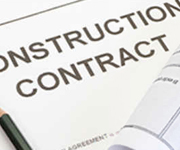Sponsored content from Old Republic Surety

Surety underwriters ask a lot of questions. They do so to fully understand your business to better support your project opportunities. Part of the process is determining you qualify for the size and scope of the projects for which you require bonds. If your organization cannot carry out the construction contract, your surety is obligated to carry out the project according to the construction contract terms. This two-part article will familiarize you with bond terms, contract issues that arise in typical construction projects, and explain why surety underwriters ask so many questions in the surety bond application process.
Related: “The ABCs of Surety Bonds: What’s the difference between surety bonds and insurance?“
Surety construction bonds are generally performance bonds
According to the International Risk Management Institute, a performance bond “guarantees that the contractor will perform the work in accordance with the construction contract and related documents, thus protecting the owner from financial loss up to the bond limit (called the penal sum) in the event the contractor fails to fulfill its contractual obligations.”
If a contractor defaults on a project or cannot complete the project ― for reasons such as bankruptcy or labor challenges, for example ― the surety must perform in the contractor’s place. Surety underwriters want to write bonds on projects where the bond principal is qualified to perform the work. Therefore, they’ll review your bond request and the accompanying contract before agreeing to write your bond.
Let’s review some of the participants and questions you’ll see on your surety underwriting application.
Performance bond parties
Obligee. Think of the “o” in obligee as the “owner” of the project. It’s the entity, often a governmental body, that requires the bond. It could be a state, local government, or even a federal agency.
Principal. That is you. You are the company that requests the bond, so you can satisfy the terms of the obligee’s contractual requirements. Perhaps even before you bid on a project, the owner and your underwriter will want to know more about your character, capacity and capital, the “three Cs” of surety underwriting.
Surety. That’s Old Republic Surety or any surety company where you seek surety credit.
General application questions
Next, underwriters will want to understand the project you’re about to undertake. So they’ll ask for a thorough project description. Simply attaching the contract is only the start. The underwriter will want to know the following, at a minimum:
- • Have you, the bond principal, ever worked with this owner or general contractor (if you’re a subcontractor)? What was that project? Was the project outcome successful?
- If the project is for a private owner can the financing to fund 100% of the project be confirmed?
- What is the proposed project scope? Have you worked on a project similar size and scope? Was that project profitable?
- Geographically, are there any constraints that could impact your ability to complete the project? Are there any logistical challenges such as limited staging and laydown areas on the construction site?
- What is the warranty period? Is this a normal warranty length, or is it an unusually long warranty period?
- Are any manufacturers involved in the warranties? Are the manufacturers warranties pass through to the project owner?
Other items your surety will review
- What is the contract start date? How does the start date combine with existing contracts already in progress?
- Is the construction schedule adequate?
- What does the contract include as warranty terms? Are they reasonable?
- What are the payment terms? Is payment conditioned on the achievement of specific benchmarks or is payment for work put in place invoiceable monthly? Are there any onerous requirements for the acceptance of an invoice for payment?
- Does the contract provide for retainage? This is normally in the form of 5%-10% of the total of each accepted invoice held back until the completion and acceptance of the project by the project owner.
- What are the terms to achieve substantial completion and the turn over of the project to the owner for its intended use?
- What damages apply? We’ll talk more about these later in the article.
Topics

 Surety Bond Quarterly Professionals in Surety Bonding
Surety Bond Quarterly Professionals in Surety Bonding
